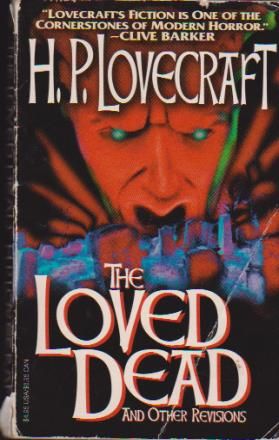Victoria Silverwolf
Vegetarian Werewolf
The next section of the book is called "Acts of God and Other Horrors":
*"Flies" by Isaac Asimov (The Magazine of Fantasy and Science Fiction, June 1953) -- Maybe the most unAsimovian story the Good Doctor ever wrote. It's a strange thing about a fellow who is always bothered by flies, and another fellow who uses technology which can reveal the emotions of animals to find out why.
"The Night Wire" by H. F. Arnold (Weird Tales, September 1926) -- A news wire service receives teletype notices of a strange disaster happening at a place unknown. An oddly distant yet haunting tale.
"Last Respects" by Dick Baldwin (Brother Theodore's Chamber of Horrors, 1975) -- Two hospital workers have to deal with the corpse of a recently deceased patient. Manages to be gruesome without any supernatural content, with a powerful ending.
"The Pool of the Stone God" by A. Merritt (as by "W. Fenimore," 1923) -- Not known to be the work of the famous fantasist until the 1970's. In any case, this is an old-fashioned story about castaway explorers who find an island with a body of water full of pearls, guarded by the statue of a winged idol. Unusual for this kind of "lost race" adventure in that it is very short. Decently written, but with one distasteful racist remark in passing.
*"A Tale of the Thirteenth Floor" by Ogden Nash (The Magazine of Fantasy and Science Fiction, July 1955) -- The noted creator of light verse here offers a long narrative ballad about gangsters and a haunted hotel. A bit too Robert W. Service in style for my taste.
"The Tree" by Dylan Thomas (1955) -- The famous poet creates a prose piece about a young boy who is told that a certain tree is the "first tree" (the one in the Garden of Eden, and the one on which Christ was nailed) by an old, Bible-obsessed man. When a feeble-minded stranger shows up, this leads to a shocking conclusion. As you might expect, poetically written.
"Stroke of Mercy" by Parke Godwin (Rod Serling's The Twilight Zone Magazine, September 1981) -- A man in early 19th century France, about to participate in a duel, has flashes of his life in future wars. Besides being a strong story, the author proves to have skill in using a variety of narrative styles for each time period.
"Lazarus" by Leonid Andreyev (1906; translated from Russian) -- The Biblical man who came back from the dead confronts the living. A thoughtful, philosophical tale.
*"Flies" by Isaac Asimov (The Magazine of Fantasy and Science Fiction, June 1953) -- Maybe the most unAsimovian story the Good Doctor ever wrote. It's a strange thing about a fellow who is always bothered by flies, and another fellow who uses technology which can reveal the emotions of animals to find out why.
"The Night Wire" by H. F. Arnold (Weird Tales, September 1926) -- A news wire service receives teletype notices of a strange disaster happening at a place unknown. An oddly distant yet haunting tale.
"Last Respects" by Dick Baldwin (Brother Theodore's Chamber of Horrors, 1975) -- Two hospital workers have to deal with the corpse of a recently deceased patient. Manages to be gruesome without any supernatural content, with a powerful ending.
"The Pool of the Stone God" by A. Merritt (as by "W. Fenimore," 1923) -- Not known to be the work of the famous fantasist until the 1970's. In any case, this is an old-fashioned story about castaway explorers who find an island with a body of water full of pearls, guarded by the statue of a winged idol. Unusual for this kind of "lost race" adventure in that it is very short. Decently written, but with one distasteful racist remark in passing.
*"A Tale of the Thirteenth Floor" by Ogden Nash (The Magazine of Fantasy and Science Fiction, July 1955) -- The noted creator of light verse here offers a long narrative ballad about gangsters and a haunted hotel. A bit too Robert W. Service in style for my taste.
"The Tree" by Dylan Thomas (1955) -- The famous poet creates a prose piece about a young boy who is told that a certain tree is the "first tree" (the one in the Garden of Eden, and the one on which Christ was nailed) by an old, Bible-obsessed man. When a feeble-minded stranger shows up, this leads to a shocking conclusion. As you might expect, poetically written.
"Stroke of Mercy" by Parke Godwin (Rod Serling's The Twilight Zone Magazine, September 1981) -- A man in early 19th century France, about to participate in a duel, has flashes of his life in future wars. Besides being a strong story, the author proves to have skill in using a variety of narrative styles for each time period.
"Lazarus" by Leonid Andreyev (1906; translated from Russian) -- The Biblical man who came back from the dead confronts the living. A thoughtful, philosophical tale.


